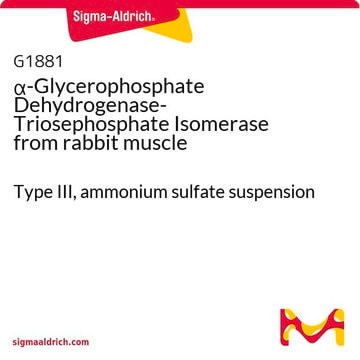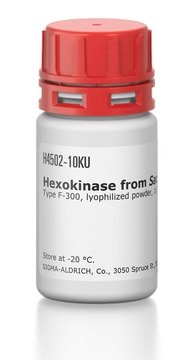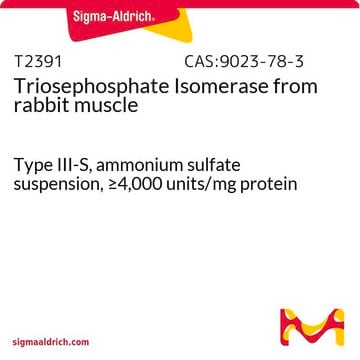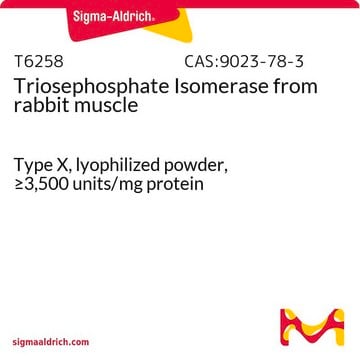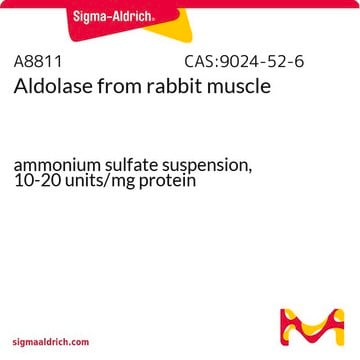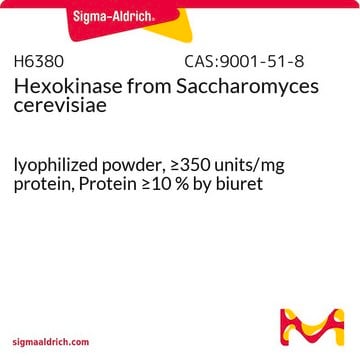F0137
Fructose-6-phosphate Kinase from Bacillus stearothermophilus
Type VII, lyophilized powder, ≥50 units/mg protein
Sinónimos:
6-Phosphofructokinase, ATP:D-fructose 6-phosphate 1-phosphotransferase
Iniciar sesiónpara Ver la Fijación de precios por contrato y de la organización
About This Item
Productos recomendados
tpo
Type VII
formulario
lyophilized powder
actividad específica
≥50 units/mg protein
mol peso
34 kDa
Condiciones de envío
wet ice
temp. de almacenamiento
−20°C
Descripción general
Fructose-6-phosphate kinase from Bacillus stearothermophilus, a 34 kDa enzyme, belongs to phosphofructokinase (PFK) - like superfamily. The glutamate 161 and arginine 162 residues at the active site are crucial for substrate binding.
Research Area: Cell Signaling
Bacillus stearothermophilus phosphofructokinase (BsPFK) is a homotetramer that is allosterically inhibited by phosphoenolpyruvate (PEP), which binds along one dimer-dimer interface.
Bacillus stearothermophilus phosphofructokinase (BsPFK) is a homotetramer that is allosterically inhibited by phosphoenolpyruvate (PEP), which binds along one dimer-dimer interface.
Aplicación
Fructose-6-phosphate Kinase from Bacillus stearothermophilus was shown to interact with neuronal nitric oxide synthase (nNOS) causing a defect in glycolytic metabolism and increased fatigability in dystrophic muscle.
Fructose-6-phosphate Kinase from Bacillus stearothermophilus has been used in the assay mixture for mass spectrometry assay for phosphoglucoisomerase (PGI) (G6P to F6P reaction).
Fructose-6-phosphate kinase from Bacillus stearothermophilus has been used:
- in steady state analysis of phosphofructokinase activity in the presence of ATP deuterated at the C8 position(C8-D ATP)
- for standard curve generation for quantifying muscle phosphofructokinase (PFK) activity
Acciones bioquímicas o fisiológicas
Fructose-1,6-bisphosphatase (FBP) is an important enzyme in glucose metabolism. It catalyzes the hydrolysis of fructose-1,6-bisphosphate to fructose-6-phosphate and inorganic phosphate. Fructose-6-phosphate kinase converts fructose-6-phosphate into fructose 1,6-bisphophate in the rate limiting step of the glycolysis cycle.
Phosphofructokinase (PFK) is an essential bifunctional enzyme that serves as a critical regulator in the intermediate stages of glycolysis. PFK is strongly linked to caveolae and is brought to caveolae by caveolin-1 in vascular smooth muscle cells (VSMCs).
Definición de unidad
One unit will convert 1.0 μmole of fructose 6-phosphate and ATP to fructose 1,6-diphosphate and ADP per minute at pH 9.0 at 30 °C.
Forma física
Lyophilized powder containing buffer salt (e.g. phosphate buffer, or Tris buffer with NaCl)
Código de clase de almacenamiento
11 - Combustible Solids
Clase de riesgo para el agua (WGK)
WGK 3
Punto de inflamabilidad (°F)
Not applicable
Punto de inflamabilidad (°C)
Not applicable
Equipo de protección personal
Eyeshields, Gloves, type N95 (US)
Certificados de análisis (COA)
Busque Certificados de análisis (COA) introduciendo el número de lote del producto. Los números de lote se encuentran en la etiqueta del producto después de las palabras «Lot» o «Batch»
¿Ya tiene este producto?
Encuentre la documentación para los productos que ha comprado recientemente en la Biblioteca de documentos.
Los clientes también vieron
Gamut of glycolytic enzymes in vascular smooth muscle cell proliferation: Implications for vascular proliferative diseases
Sarkar A, et al.
Biochimica et Biophysica Acta (BBA)-Molecular Basis of Disease, 167021-167021 (2024)
Analysis of the phosphofructokinase subunits and isoenzymes in human tissues
G.A. Dunaway et al.
The Biochemical Journal, 251, 755-757 (1988)
M D Wallace et al.
Oncogene, 33(28), 3688-3695 (2013-08-27)
Defective DNA replication can result in genomic instability, cancer and developmental defects. To understand the roles of DNA damage response (DDR) genes on carcinogenesis in mutants defective for core DNA replication components, we utilized the Mcm4(Chaos3/Chaos3) ('Chaos3') mouse model that
[Pain treatment. Systematized education in epidural pain treatment].
I H Iversen
Sygeplejersken, 85(8), 24-31 (1985-02-20)
The role of the C8 proton of ATP in the regulation of phosphoryl transfer within kinases and synthetases
Kenyon CP, et al.
BMC Biochemistry, 12(1), 36-36 (2011)
Nuestro equipo de científicos tiene experiencia en todas las áreas de investigación: Ciencias de la vida, Ciencia de los materiales, Síntesis química, Cromatografía, Analítica y muchas otras.
Póngase en contacto con el Servicio técnico

